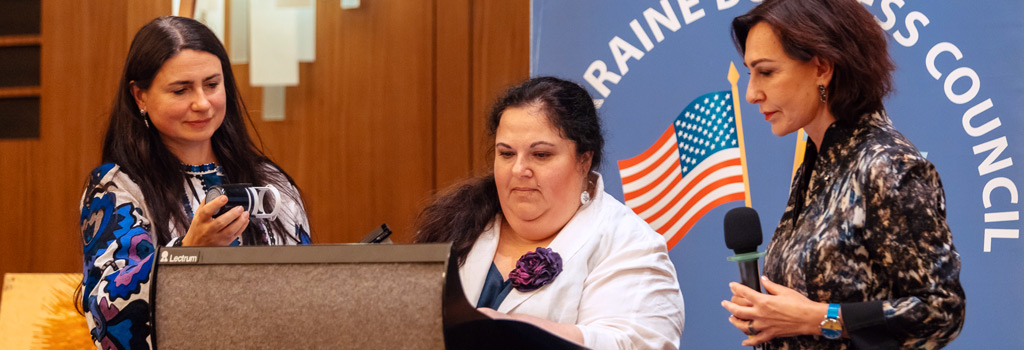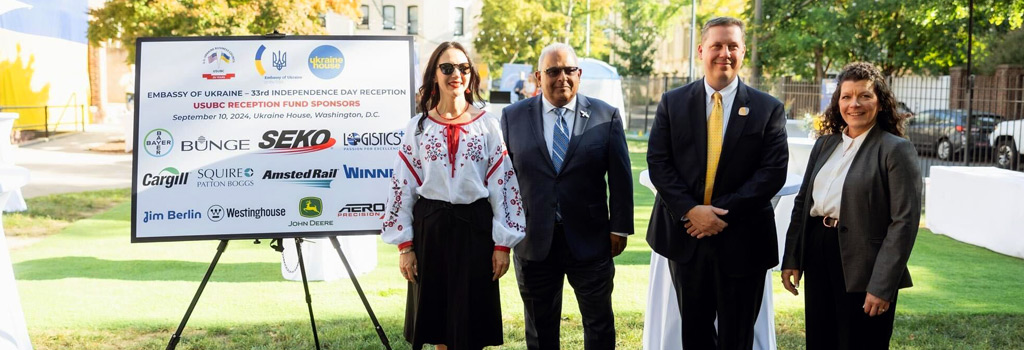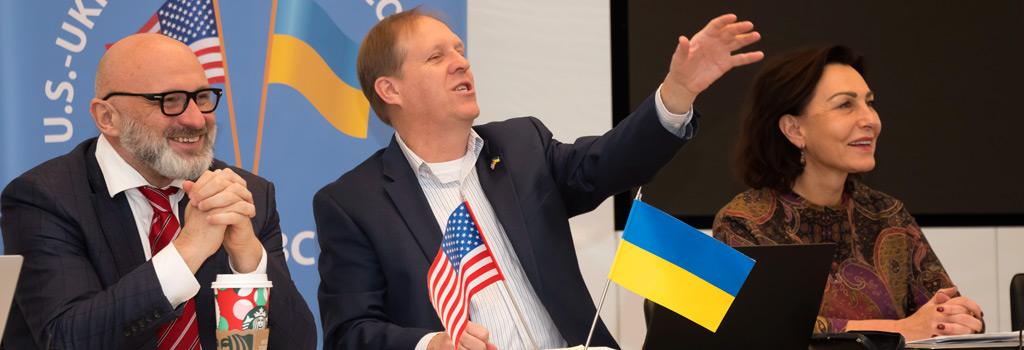Featured Galleries USUBC COLLECTION OF OVER 160 UKRAINE HISTORIC NEWS PHOTOGRAPHS 1918-1997
 Holodomor Posters
Holodomor Posters

America still stands with Ukraine
 The Ukrainian Weekly,
The Ukrainian Weekly,
Washington, D.C., Feb 26, Wed, 2020
I doubt that anyone could have imagined back last summer that Ukraine would be at the center of an impeachment of an American president. Yet, since late September, when the story broke of allegations of President Donald Trump’s campaign to pressure Ukraine to publicly commit to investigating a political opponent, notably by withholding military aid, Ukraine has been in the news on a daily basis.
How has impeachment impacted America’s public perceptions of Ukraine? More importantly, how has it affected U.S. support for Ukraine? First, as tragic as this scandal has been for the United States, it has not been the unmitigated disaster for Ukraine or its standing with America’s public and political elites that some fear. Mr. Trump’s politicization of the U.S.-Ukraine relationship has harmed and complicated U.S.-Ukraine relations in the short-term. The lack of a bilateral ambassador, a special envoy for Ukraine (who most likely will not be replaced), or Ukraine policy experience at senior levels of the National Security Council, certainly does not help matters. Thanks to the shadow foreign policy of Rudy Giuliani and other Trump lieutenants, there is understandable confusion and consternation in Ukraine regarding U.S reliability and commitment. Moreover, America’s moral standing in Ukraine has been somewhat damaged because of the scandal – although I would argue not irreparably.
And yet, despite the mess, U.S. support for Ukraine remains robust.
In terms of public attention, the “Ukraine affair” offers a mixed picture. Not without foundation, Ukraine is perceived as corrupt, although often its extent is exaggerated. At the same time, members of Congress during the impeachment hearings and many in the media have often pointed out that Volodymyr Zelenskyy is at least trying to fight corruption – something that cannot be said of other countries such as Russia.
The American people have become more familiar with Ukraine. The country has become part of the American story – even if not in the way one would have wanted. Significantly, far more Americans are now aware of Ukraine’s struggle against Russian aggression. The media often refer to Ukraine not just as a partner or friend, but as an ally, something not often heard before the scandal erupted. Alas, there are some regrettable exceptions, notably comments by Fox News host Tucker Carlson, who questions giving aid to Ukraine and sides with Russia in its war against Ukraine, but most Americans recognize that Vladimir Putin’s invasion and occupation of Ukraine is just plain wrong and that Ukraine deserves our help.
Millions of Americans watched the impeachment hearing testimony of witnesses such as William Taylor, George Kent, Marie Yovanovitch, Fiona Hill, Alexander Vindman, David Holmes and others. In each opening statement, as well as during the questioning, you heard unequivocal, eloquent, well-argued backing for Ukraine’s Western direction and its struggle against Russia’s ongoing aggression. The same holds true in the presentations during the Senate trial. Supporting Ukraine in defending itself against Putin’s predations is almost a given; it is an article of faith. This has reinforced in the public mind the reality that America stands with Ukraine, notwithstanding President Trump’s inexplicable affection for Mr. Putin, his negative comments about Ukrainians and his pressure on Ukraine for personal political reasons.
Importantly, the Washington policy world remains supportive, with all of the key foreign policy think-tanks – liberal, moderate and conservative – squarely on Ukraine’s side. Of course, the Ukrainian American community and the plethora of U.S. NGOs and individuals who have worked with and in Ukraine for many years remain steadfast in their support.
Strong, consistent statements on Ukraine also continue to flow from the State Department, the U.S. Embassy in Kyiv, and the U.S. Mission to the Organization for Security and Cooperation in Europe. These send the message to Ukraine, Russia and the rest of the world that, despite the current troubles, the United States is committed to Ukraine.
Both Democrats and Republicans in Congress have been supportive. During the House hearings, even those Republicans who parroted Mr. Trump’s talking points into alleged Ukrainian interference into the 2016 U.S. elections have not challenged the notion that the U.S. stands behind Ukraine in its war with Russia and have voted for continued assistance.
On December 19, President Trump signed a massive spending bill to keep the U.S. government running. This bipartisan, bicameral appropriations legislation approved nearly $700 million for security and foreign assistance for Ukraine in Fiscal Year 2020, a slight increase over FY 2019. The aid includes military/security assistance to help Ukraine fight Russia’s aggression. It also encompasses vital non-security assistance that supports Ukraine’s democratic trajectory, rule of law, anti-corruption, economic development, energy, health and agriculture.
The end of the year also saw passage of the massive National Defense Authorization Act (NDAA), which imposes sanctions related to Russia’s Nord Stream 2 pipeline and bars military-to-military cooperation with Russia. The NDAA also includes the reauthorization of $300 million of funding for the Ukraine Security Assistance Initiative.
There are other pieces of legislation on Ukraine in this that have been introduced or seen some kind of action since the scandal emerged. These include the House- and Senate-introduced Ukraine Religious Freedom Support Act (drafted by my former colleagues at the U.S. Helsinki Commission) that opposes violations of religious freedoms by Russia and its proxies in the occupied territories, and a bipartisan resolution introduced just a few weeks ago by the co-chairs of the House Ukraine Caucus “reaffirming U.S. support for the Ukrainian people and Ukraine’s democratic trajectory, free from Russian malign influence.”
Notwithstanding the current adversity, I remain confident that U.S. political support to Ukraine, as well as concrete assistance – both security and non-security – will not only be maintained, but even see future increases in certain areas. The longstanding pattern of bipartisan support for Ukraine that Congress has exhibited for the last century will continue. As one who has been a small part of this world for nearly four decades and has witnessed the evolution of U.S. policy towards Ukraine, I have no doubt that there are enough serious people in Washington’s national security and foreign policy establishment and in the Congress – both Democrats and Republicans – who understand that an independent Ukraine is essential to our security and to a Europe “whole, free and at peace.”
Don’t worry, Ukraine, in spite of it all, America still has your back.
Orest Deychakiwsky is currently serving as Senior Adviser to USUBC.
LINK: http://www.ukrweekly.com/uwwp/america-still-stands-with-ukraine/

















